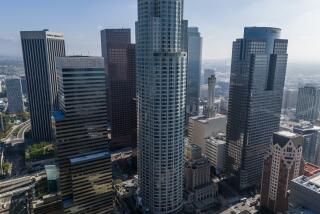U.S. Bank Tower sold to investors from Singapore
The tallest building in the West, the financially struggling U.S. Bank Tower in downtown Los Angeles, is being sold to Singapore investors for $367.5 million.
At 72 stories, the circular structure has commanded the city skyline since it was completed in 1989 and is one of the best-known office buildings in the country. It was previously named Library Tower and also First Interstate World Center.
The skyscraper designed by the New York firm of star architect I.M. Pei is the tallest building in L.A. — but not the most popular with tenants. It is only about 60% leased, according to real estate data provider CoStar.
Although distinctive, “its cylindrical design is an inefficient layout for an office building,” real estate analyst Jed Reagan of Green Street Advisors said. Rectangular floors are considered more efficient.
Selling the landmark is long-suffering landlord MPG Office Trust Inc., which has struggled with deep debt and an anemic office market since the recession. The Los Angeles real estate investment trust has been on a selling spree in recent years in a bid to reduce debt and stay afloat.
The buyer is Singapore developer Overseas Union Enterprise, MPG said Monday in a terse announcement. Overseas Union develops and operates commercial properties in Southeast Asia such as hotels, condominiums and offices.
MPG declined to discuss the sale, and Overseas Union did not respond to a request for comment.
U.S. Bank Tower also suffers from its previous success as a bastion of corporate American style in the 1980s and 1990s, when white-collar companies were typically more formal and hierarchical. Much of the empty space for rent reflects a departing era with big offices for executives hogging all the prime window space and bullpen work stations for support staff clustered inside around the elevator cores.
“That kind of an office layout really is no longer attractive to most tenants,” Reagan said. “It would take a lot of money to renovate each floor and reconfigure it as tenants would like.”
Many firms are shifting toward open-plan workplaces without individual offices. Such layouts are intended to increase efficiency and spur employee creativity through frequent interactions. Open floor plans also use less overall space than traditional offices, enabling companies to spend less on rent.
The sale of U.S. Bank Tower is expected to bring MPG a profit of $103 million and relieve it of paying substantial mortgage debt. If it can use the profit to refinance other debt coming due this year, MPG “may live to see another day,” Reagan said.
The skyscraper has shown up in numerous television shows and movies including the 1996 thriller “Independence Day,” in which alien invaders appeared to blow it up.
“U.S. Bank Tower is definitely the most famous building they own,” Reagan said of MPG, “but it’s not their crown jewel.”
The $367.5-million sale reflects a “decent price,” he said. “Other holdings such as Wells Fargo Tower are much better leased and more valuable today on a per-square-foot basis.”
The U.S. Bank Tower sale includes Westlawn Garage, an underground parking structure at 5th and Flower streets that serves the Central Library and surrounding neighborhood.
Downtown L.A.’s office market has been dominated for several years by two landlords, MPG and Brookfield Office Properties Inc., which own the majority of the top-drawer buildings. They use their clout to set rents in the financial district, brokers have said.
“This sale takes away some of the hold that MPG had on the market and allows for a new company to come in and re-price office product in downtown Los Angeles,” said Hans Mumper, managing director of the L.A. area for real estate brokerage Colliers International.
The sale of a trophy Los Angeles office building to an investor from the Far East calls to mind a period in the late 1980s when Japanese buyers were snapping up office towers, golf courses and other prime real estate, which unnerved many Americans. A lot of those properties lost value in the 1990s real estate crash and were taken over by other owners.
“I don’t think there is anything to fear” from overseas owners, Mumper said. “We welcome the investment.”
Expect more such investment if other major commercial properties hit the local market, said Michael Zietsman, a managing director at real estate brokerage Jones Lang LaSalle.
“The returns on U.S. real estate are attractive relative to buying costs,” he said. “When we see any decent-quality asset come up for sale in L.A., there will be a significant amount of interest — from domestic pension funds to big investors around the world.”
More to Read
Inside the business of entertainment
The Wide Shot brings you news, analysis and insights on everything from streaming wars to production — and what it all means for the future.
You may occasionally receive promotional content from the Los Angeles Times.










